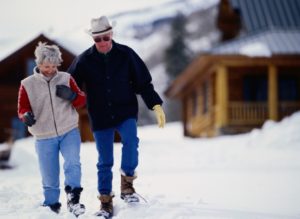 There is a greater risk for winter falls, especially among older adults, as the roads and walkways become slippery due to ice and snow. Falls, in general, are detrimental to the health of older people because they can cause disability and worsen quality of life. Therefore, it’s important to not only recognize a potential fall but know how to prevent winter falls.
There is a greater risk for winter falls, especially among older adults, as the roads and walkways become slippery due to ice and snow. Falls, in general, are detrimental to the health of older people because they can cause disability and worsen quality of life. Therefore, it’s important to not only recognize a potential fall but know how to prevent winter falls.
The older a person is the more detrimental the effects of a fall can be. For example, someone who is over the age of 80 only has a 50 percent chance of returning back to their home if they broke their hip as a result of a fall. Not being able to stay at home negatively impacts one’s quality of life, including mental and emotional health.
Advertisement
Below you will uncover the risk factors associated with wintertime falls along with some prevention tips.
Danger signs
There are many different factors that contribute to a senior person’s risk of fall. For starters, many seniors may encounter rapid weight loss or loss of muscle. This can result in weakness and loss of stability, which increases their risk of falls.
Furthermore, vision problems are more common among seniors and as a result they can’t identify obstacles as clearly, resulting in easier trips and falls
Some people may have neurodegenerative diseases or other chronic health problems such as diabetes or even low blood pressure. These healthy problems can cause seniors to become unsteady or impair their ability to walk or stand.
Lastly, certain medications can impair a person’s judgment, such as muscle relaxants or sedatives.
Advertisement
As you can see, there are many different risk factors that contribute to a senior’s risk of falling. When combined with the winter elements, the risk of falls becomes greater.
Preventing falls
Here are some tips to prevent falls among seniors, especially in the wintertime.
- Ensure walkways are cleared – they should be shoveled and salted. Wet or snowy boots in the house should be kept aside so that the floor in the home is not wet. Clean up the mess brought from the outdoors right away.
- Remove obstacles – tack down carpets, ensure boxes and other obstacles are not in the middle of the room.
- Watch alcohol intake – seniors should be mindful of their alcohol intake, especially if they are on medications, as the side effects may make them unsteady and increase the risk of falls.
By following these prevention tips, you can have greater success in reducing the risk of falls this winter.
